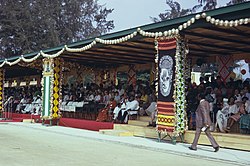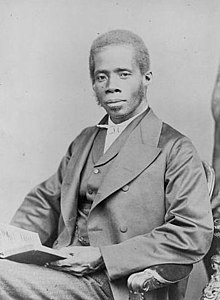IntroductionWelcome to the Pan-Africanism portal!
Bienvenue sur le portail panafricanisme!   Pan-Africanism is a worldwide movement that aims to encourage and strengthen bonds of solidarity between all indigenous peoples and diasporas of African ancestry. Based on a common goal dating back to the Atlantic slave trade, the movement extends beyond continental Africans with a substantial support base among the African diaspora in the Americas and Europe. Pan-Africanism can be said to have its origins in the struggles of the African people against enslavement and colonization and this struggle may be traced back to the first resistance on slave ships—rebellions and suicides—through the constant plantation and colonial uprisings and the "Back to Africa" movements of the 19th century. Based on the belief that unity is vital to economic, social, and political progress, it aims to "unify and uplift" people of African ancestry. (Full article...) Selected articleGarveyism is an aspect of black nationalism that refers to the economic, and political policies of UNIA-ACL founder Marcus Garvey. The ideology of Garveyism centers on the unification and empowerment of African-American men, women and children under the banner of their collective African descent, and the repatriation of African slave descendants and profits to the African continent. Garvey was fought by the African-American establishment in the U.S. An investigation by the Justice Department, directed by J. Edgar Hoover, led to Garvey's arrest on charges of mail fraud in January 1922, and his projects collapsed. Selected biography
Edward Wilmot Blyden (3 August 1832 – 7 February 1912) was an educator, writer, diplomat, and politician primarily in Liberia. Born in the West Indies, he joined the free black immigrants from the United States who migrated to the region. He taught for five years in the British West African Colony of Sierra Leone in the early 20th century. His writings on pan-Africanism were influential in both colonies. These were founded during the slavery years for the resettlement of free blacks from Great Britain and the United States. Blyden's writings attracted attention in the sponsoring countries as well. He believed that Zionism was a model for what he called Ethiopianism, and that African Americans could return to Africa and redeem it. He believed political independence to be a prerequisite for economic independence, and argued that Africans must counter the neo-colonial policies of former colonial powers. Selected historyJim Crow laws were state and local laws that enforced racial segregation in the Southern United States. All were enacted in the late 19th and early 20th centuries by white Democratic-dominated state legislatures after the Reconstruction period, the laws were enforced until 1965. In practice, Jim Crow laws mandated racial segregation in all public facilities in the states of the former Confederate States of America, starting in the 1870s and 1880s, and were upheld in 1896, by the U.S. Supreme Court's "separate but equal" legal doctrine for facilities for African Americans, established with the court's decision in the case of Plessy vs. Ferguson. Moreover, public education had essentially been segregated since its establishment in most of the South, after the Civil War (1861–65). Selected cultureThe term Caribbean culture summarises the artistic, musical, literary, culinary, political and social elements that are representative of the Caribbean people all over the world. The Caribbean's culture has historically been influenced by that of African and Amerindian traditions. It has also been strongly influenced by that of its linguistic, economic, and cultural neighbor, the United States. As a collection of settler nations, the contemporary Caribbean has been shaped by waves of migration that have combined to form a unique blend of customs, cuisine, and traditions that have marked the socio-cultural development of the area. Selected imagesOrganisationsAll-African People's Revolutionary Party · African Society for Cultural Relations with Independent Africa · African Unification Front · African Union · African Queens and Women Cultural Leaders Network · Conseil de l'Entente · Convention People's Party · East African Community · Economic Freedom Fighters · Global Afrikan Congress · International African Service Bureau · International League for Darker People · Organisation of African Unity · Pan African Association · Pan-African Congress · Pan Africanist Congress of Azania · Rassemblement Démocratique Africain · Pan Africa Chemistry Network · Pan African Federation of Accountants · Pan-African Freedom Movement for East and Central Africa · Sahara and Sahel Observatory · UNIA-ACL · ZANU–PF
See also
& Festivals Photo by Helinä Rautavaara (1977) Publications
Films and TVAudios and videosDid you know ...that the colours of the Flag of Benin (pictured) allude to the Pan-Africanist movement and pay tribute to Ethiopia, the oldest independent country in Africa?
Selected quotesIn addressing the first ever conference of the Organization of African Unity (1st May 1963). The Gambian Pan-Africanist and nationalist Alieu Ebrima Cham Joof delivered the following message:
Pan-Africanism topicsCategoriesThings you can do
Related portalsAssociated WikimediaThe following Wikimedia Foundation sister projects provide more on this subject:
Discover Wikipedia using portals | |||||||||||||||||||||||||||||||






























